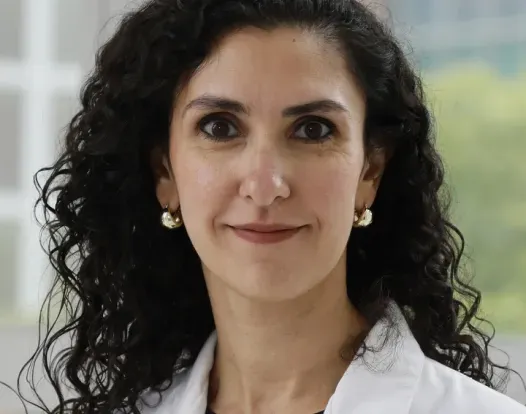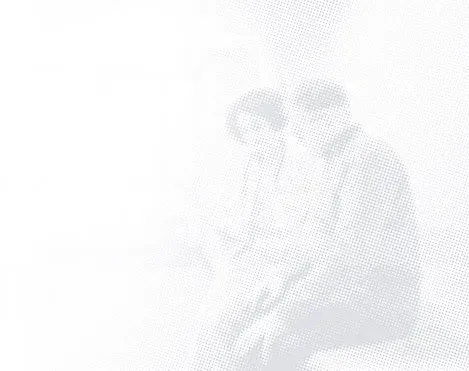These researchers dedicate their careers to finding new treatments and cures for people with cancer.


Over the course of her oncology career, Dr. Sara Myers has seen how acts of support, no matter how small they may seem, can make a huge difference.
A breast cancer specialist at The Ohio State University Comprehensive Cancer Center (OSUCCC – James), Dr. Myers has devoted her career to developing personalized care plans for her patients and researching ways to better help them through the process. In particular, she focuses on younger people with breast cancer, who are often overlooked in clinical trials and treatment studies. She received a 2025 Career Development Award from Conquer Cancer, which supports her research on financial toxicity in breast cancer care. Financial toxicity refers to the multitude of negative financial impacts that medical treatment can have on a person, from loss of savings to extensive debt. With help from the grant, Dr. Myers hopes to further the understanding of how cancer impacts all aspects of a person’s life, whether it’s the physical burden, the financial cost of treatment, or the effect on mental and emotional well-being.
As she pursues this vital work, Dr. Myers notices the way people around her are driven to help. When she received her grant, she vividly remembers people approaching her to offer their congratulations and support. To her, the moment served as a reminder of how personal working in oncology can be. When people affected by cancer combine their efforts to support patients and researchers alike, actions that may seem small on their own turn into something truly impactful.
In this interview, Dr. Myers discusses what drew her to breast cancer care, the importance of resilience in her work, and the way individual support can make a difference.
Conquer Cancer: What impact do you expect the Career Development Award will have on your career?
Dr. Myers: I think we've done a wonderful job with scientific advancements and pre-clinical and translational research for our patients, but the extent to which we have made similar advancements in quality of life and patient-centered outcomes falls short. This Career Development Award allows me to make a difference on financial toxicity, which we know is a major issue for patients and survivors of breast cancer.
Conquer Cancer: Can you speak to the difficulties that people in the early stages of their career are experiencing right now?
Dr. Myers: Early-stage investigators have to grapple with establishing their clinical volume at the same time as creating a sustainable research agenda. Receiving the Career Development Award allows me to focus my attention on ways to improve quality of life and cancer care not just for one patient but for an entire population. Because my research is informed directly by caring for young adult women with breast cancer, it is extremely meaningful to be able to change what living with and after cancer looks using rigorous scientific methodologies.
Conquer Cancer: What is the thing that really drives you?
Dr. Myers: A lot of the patients that I treat in my clinical area of expertise are young adult women with breast cancer. Their experience resonates deeply with me. In addition to currently also being a young adult, I have three daughters. I want to make care better for this population because they are underserved. They're not well-represented in clinical trials. They face a huge amount of vocational disruption from treatment-related adverse events. Being able to give this demographic the attention they deserve is gratifying. I can’t know that tomorrow I won’t be diagnosed with breast cancer and facing the same struggles they endure. I worry about the same possibility for my daughters. That’s why this work is so personal for me.
Conquer Cancer: What is the thing that you see happening that gives you hope?
Dr. Myers: I’m always moved by the way people step up for others in times of need. It reminds me that there is so much good in this world. For example, the very fact that I received this award means that others saw value in this work. It reflects an underlying commitment among individuals to help one another, and that is incredibly powerful. As long as that motivation exists, I believe we can truly make a difference.
Conquer Cancer: What would you say to an investigator out there right now, especially somebody who's really struggling to find funding?
Dr. Myers: If the work matters, it’s worth doing. And it’s work we must commit to every single day, regardless of whether funding is available. I lean heavily on my mentors and their advice, drawn from similar experiences. A lack of funding today doesn’t mean it won’t come tomorrow. When resources are scarce, partnering with those who do have funding can be invaluable. I’ve worked hard to build collaborations across institutions—learning from others, sharing ideas, and contributing to their science to make it stronger. That, I believe, is the way forward. Perhaps this challenging funding environment will ultimately foster deeper, more meaningful multidisciplinary collaboration.
Conquer Cancer: What would you say to a donor who wonders if their smaller donation actually makes a difference?
Dr. Myers: For my patients, every donation truly matters. Financial toxicity refers to the burden of treatment costs and how it affects psychological well-being and coping behaviors. Often, these coping strategies involve cutting back on essentials to offset medical expenses. A contribution as small as $25 can cover a medication copay. This is something that may have a downstream impact on survival and recurrence outcomes. I genuinely believe that every single contribution makes a difference.
Conquer Cancer: What does conquering cancer look like to you?
Dr. Myers: We strive to enhance quality of life. Time working, living, and spending time with family and loved ones must be rich and fulfilling. Being able to remain engaged as productive members of society even after being diagnosed with cancer, without dealing with disability from breast cancer-related lymphedema or other treatment-related complications, is paramount. To me, that is a win. That is what conquering cancer truly means.
Last Updated: 10/24/25